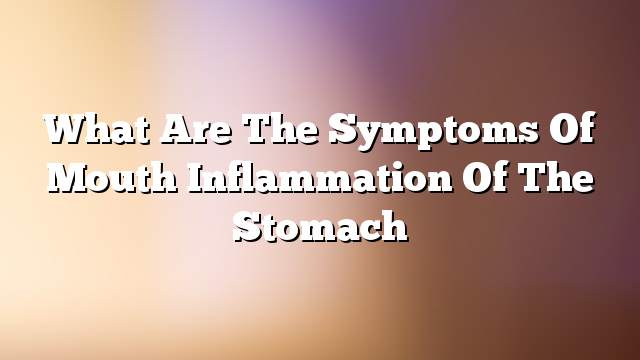Inflammation of the mouth
Gastroenteritis is a common disease that involves irritation of the lining of the stomach. The infection is often caused by the helical bacteria that causes most gastric ulcers. It may also arise from the use of non-steroidal analgesics or alcohol in large quantities. This inflammation is usually mild and does not require any medications. For healing, and responds to treatment well in cases where this is required. Stomach ulcers may cause pain in the upper abdomen, and may worsen into stomach ulcers or gastric cancer in some cases. Inflammation of the mouth of the stomach either suddenly and within a short period of time (acute inflammation), or slowly in a long period (chronic inflammation).,
Symptoms of mouth infection of the stomach
The mouth infection of the stomach symptoms and several signs, with the possibility of injury to the person without suffering from any symptoms, and these symptoms vary from person to person, and does not require a meeting in one patient. These symptoms include:
- Suffering from abdominal pain, especially at the top of it.
- Exhaustion and feeling very nauseated, and sometimes accompanied by indigestion.
- Feeling bloated or having gas in the abdomen, causing the patient to burp.
- Feel the burning of the stomach or a feeling of discomfort especially between meals or at night.
- The feeling of anorexia.
- The patient’s stool color is dark black.
- The presence of blood in vomiting may also exist in a substance similar to the color of coffee ground.
Causes and factors of mouth inflammation of the stomach
The mouth infection of the stomach produces a weakness in the lining of the mucous membrane which is the function of protecting the acids, thus becoming vulnerable to irritation and ulcers, and the following diseases and factors are the most common causes of this:
- Bacterial infection : Specifically those resulting from the bacteria spiral, which is one of the most common infection in the world, and yet suffer some of the complications of this infection, such as inflammation of the mouth of the stomach or ulcer or others. Some scientists attribute the susceptibility of some people to gastric mouth infection compared to other healthy people to the presence of genetic factors or to certain practices in their lifestyle involving the use of painkillers, alcohol or smoking.
- Aging : It is noticeable prevalence of mouth infection in the stomach of the older age group, because the mucous membranes of the stomach have a thicker, so the chance of infection with the bacteria spiral or autoimmune diseases greater than the youngest.
- Frequent use of pain relievers : The use of common painkillers, such as aspirin, ibuprofen and naproxen, is linked to the infection of the mouth of the stomach both qualitative: acute and chronic; because the use of these painkillers on a regular basis or in large quantities to reduce the amount of a particular material is of great importance in maintaining the mucosa lining the stomach And is responsible for the protection of acids, and is therefore advised in some cases the use of other types of painkillers that do not cause inflammation of the mouth of the stomach, such as those containing the compound acetaminophen.
- Suffering from stress or distress : This condition results from major surgery, exposure to infection, burning or any injuries, and is found to be associated with acute gastrointestinal inflammation.
- Drink plenty of alcohol : This may irritate the lining of the stomach and acid erosion, as eating these drinks in large quantities or repeatedly cause inflammation of the mouth of the acute stomach.
- Suffering from other medical conditions : Infection of the mouth of the stomach may be associated with other diseases, such as Crohn’s disease that affects the intestines, acquired immunodeficiency syndrome or parasitic infection.
- Infection of the mouth of the stomach with autoimmune : This results in attacking the immune cells in the body of the cells forming the wall of the stomach, thereby weakening the defenses of the stomach against the acids. This type of inflammation is more common in people who already suffer from other autoimmune diseases, such as Hashimoto disease, which affects the thyroid, or type I diabetes. Inflammation of the mouth of the stomach can also be associated with autoimmune immunity, in addition to vitamin B12 deficiency.
Treatment of mouth inflammation of the stomach
The inflammation of the mouth of the stomach depends mainly on the elimination of the underlying cause. For example, inflammation caused by the repeated use of non-steroidal analgesics is treated by avoiding the use of these drugs as much as possible, but if the cause is the infection of the bacteria helical antibiotic is required to eliminate On that infection. However, there are other drugs may be administered to patients mouth inflammation of the stomach to try to control the symptoms, including:
- Proton channel inhibitors : This type of medicine reduces the amount of acids produced from the cells of the stomach by working to close those cells. These compounds include lancoprazole, omeprazole, and isomiprazole. The use of these drugs frequently or at long intervals may increase the chance of fractures in the spine, pelvic bone and wrist bone.
- Antacids : These drugs are usually used to relieve the pain caused by inflammation of the mouth of the stomach and quickly. These compounds work to equate the acidity of the stomach chemically, and may lead to constipation or diarrhea as side effects.
